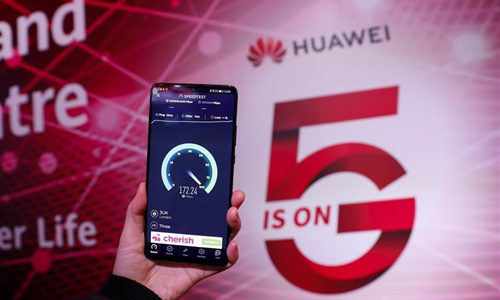Huawei says survival is keyword this year under US ban
File photo taken on Jan. 28, 2020 shows a Huawei 5G mobile phone testing speed in Huawei 5G Innovation and Experience Center in London, Britain. Huawei is "focused on keeping Britain connected" and that is "the biggest contribution we can make" to its national effort against the COVID-19 pandemic, said Huawei's Vice President Victor Zhang in an open letter released on April 13, 2020. Photo:Xinhua

Survival is Huawei's keyword this year in the face of an intensified US ban, Guo Ping, Huawei rotating chairman, said at Huawei's Global Analyst Summit on Monday, the first event it held after the US announced an intensified chip ban on the Chinese tech giant.
On Friday, the US Department of Commerce said it was amending an export rule and its Entity List to "strategically target Huawei's acquisition of semiconductors that are the direct product of certain US software and technology," according to a statement on its website.
The rule will come into effect on Friday with a 120-day grace period.
US changes to the Foreign Product Rule will inevitably affect Huawei's business, Guo said, noting that the firm will "do everything in its power and is confident it can find a solution."
The remarks were made at the opening of the event, where Guo delivered a keynote speech titled "Huawei: A Year and Beyond," sharing Huawei's experience and results of the past year, while describing the prospects for the company's development.
Guo said the firm has gotten over a difficult year since being put on the US Entity List in May last year. "Over the past year, many technologies became unavailable to us. Despite this, Huawei struggled to survive and is striving to move forward," Guo said.
The firm increased spending on research and development to "fill gaps" by 29.8 percent year-on-year in 2019, while saw its inventories jumped by 73.4 percent due to the impact of the US ban. However, it managed to achieve a revenue of 858.8 billion yuan ($120.56 billion) in 2019, up 19.1 percent year-on-year, with a net profit of 62.7 billion yuan, up 5.6 percent versus 2018.
At the end of the first quarter, Huawei had attracted more than 1.4 million developers to its self-developed HMS ecosystem, which aims to replace Google, a jump of 150 percent compared with the beginning of 2019.
Looking ahead, Huawei will not close itself off due to the US ban, but will be more open than ever, and will continue investing and innovating in three domains: connectivity, computing and smart devices, Guo said.
Huawei has also called for unified standards for the ICT industry, noting that unified standards have fueled "incredible development" for the firm, while fragmentation will only bring supply risks to global customers.
In its first official response to the latest US move to curb its access to global chip supplies, which was also announced during the summit on Friday, Huawei said the US decision is "arbitrary and pernicious," and threatens to undermine the entire industry worldwide.
Global Times